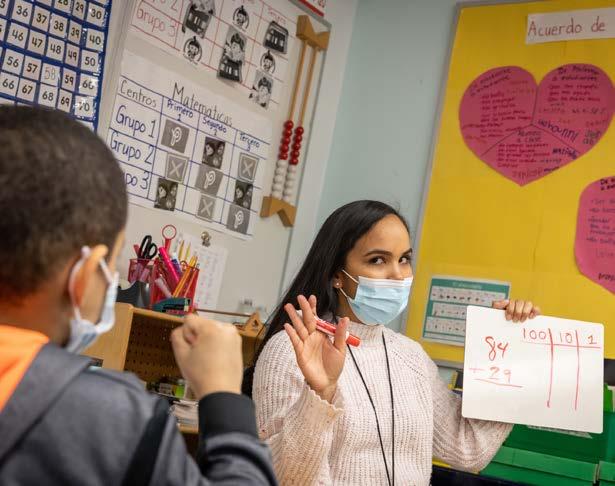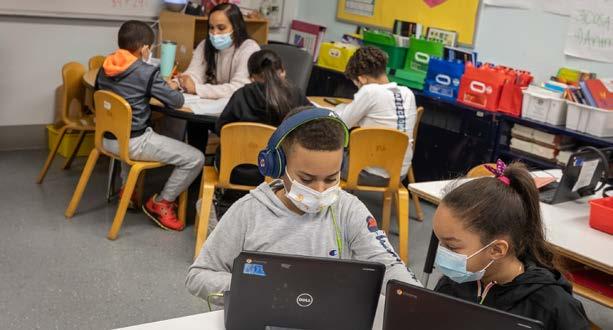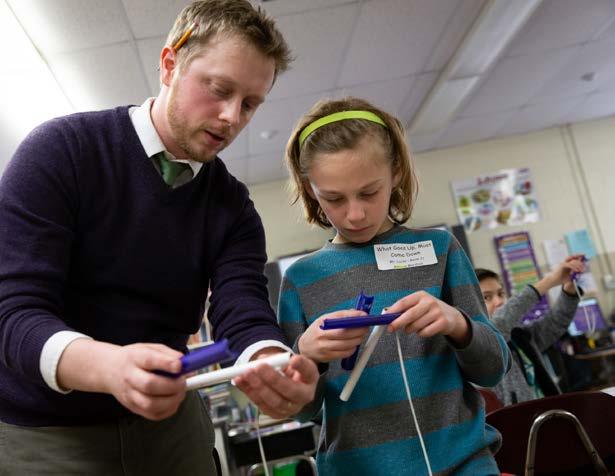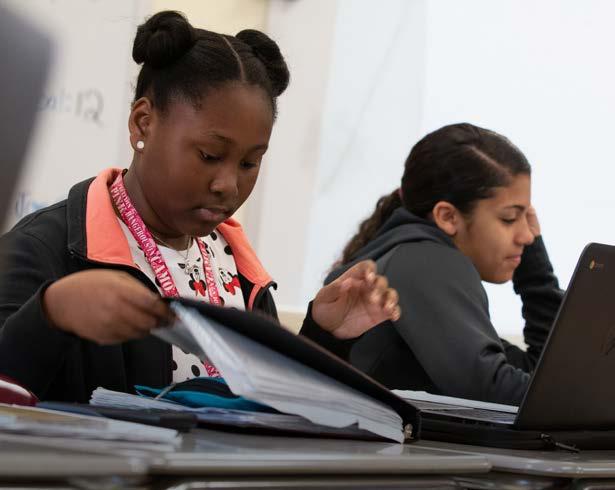
32 minute read
Priorities, Strategies, Next Steps, & Focus Areas
from Stay(ing) the Course: An update on Rhode Island's Path to a World Class Public Education System
The Committee identified four priorities as fundamental pillars – each of the priorities is important on their own; but the real power is in the four being pursued and brought to life in tandem to achieve the vision. Each of these priorities is essential to ensure that all students’ needs are met. Meaningful and sustained engagement with students and families is essential for all aspects of this work to be realized. Priorities are presented on the following page along with a progress update on each of the strategies and suggested next steps that were identified in January 2020. Areas of focus are included following the progress updates.
High Standards
Priority:
Create, build, and implement a world-class Pre-K to 12 educational system that is rooted in rigorous standards, has aligned curriculum and instruction, and ongoing assessment, and that includes comprehensive social and emotional learning, and promotes and develops multilingualism.
RIDE’s Strategic Plan also addresses this priority as Excellence in Learning. As an agency, RIDE’s core mission is to create an educational landscape that supports student learning. To achieve this mission, RIDE creates the conditions for Local Education Agencies (LEAs) to build and implement world-class Pre-K to 12 educational system that is rooted in rigorous standards, aligned curriculum and instruction, experiential learning opportunities, and ongoing assessment. RIDE bases its policy and programming decisions on the belief that all students can learn and develop as well-rounded individuals. To do this, RIDE sets high expectations for comprehensive social and emotional learning, the promotion of multilingualism, and the creation of pathways for students to identify and pursue strengths and interests. RIDE then partners with LEAs and schools to ensure they are well equipped to meet these expectations, with the end goal of improving student learning.
Strategies:
• ESTABLISH STATEWIDE STANDARDS FOR MULTILINGUAL EDUCATION.
Ongoing/In Progress. RIDE released the Blueprint for MLL Success and a Strategic
Plan that identifies sustained effective evidence-based practices to strengthen services and outcomes for Multilingual Learners (MLLs) by outlining the vision, goals, and principles of MLL education. The final version was released in September 2021. The state has also developed the High Quality Instructional Framework for Multilingual
Learners (MLLs) to Thrive. This framework for high-quality instruction for MLLs includes evidence-based, student-centered tenets of teaching and learning. These documents serve as the foundational pieces to support the development of statewide standards for multilingual education.
• CREATE ROBUST COLLEGE AND CAREER PATHWAYS THAT
PROVIDE STUDENTS WITH OPPORTUNITIES FOR INTERNSHIPS AND
WORK EXPERIENCE.
Ongoing/In Progress. RIDE has established PrepareRI, a statewide initiative to prepare all Rhode Island youth with the skills they need for jobs that pay. PrepareRI works to ensure career pathway programs are aligned to Rhode Island’s high-demand career fields; all high school students have access to a work-based learning experience, such as an internship in a relevant career field; all students have career exploration opportunities and individual learning plans based on their unique strengths and interests; over half of high school students graduate with college credit or an industry credential; and over half of high school students participate in career and technical education (CTE). PrepareRI creates annual reports that can be accessed here.
RIDE has developed updated statewide secondary regulations that were presented to the Rhode Island Council on Elementary and Secondary Education on December 7, 2021. The proposal went before the Council in early 2022 and entered a period of public comment through May 10, 2022. Additionally, the General Assembly has passed legislation that requires schools to collect and report data on the number of high school graduates and the number applying to college and vocational programs. The number/ percent of students meeting metrics related to success after high school will be tracked and reported on annually.
• ESTABLISH STATE AND LOCAL EXPECTATIONS FOR A POSITIVE SCHOOL
CULTURE, SAFE SCHOOL ENVIRONMENT, AND MEANINGFUL PARENT AND
COMMUNITY ENGAGEMENT.
Ongoing/In Progress. RIDE has created a pool of resources around social-emotional learning that are accessible here. Additionally, one of RIDE’s goals for unifying and creating alignment is centered on creating vertical alignment between RIDE’s Strategic
Plan, LEAs Strategic Plans, and coordinating annual plans and school plans required by the law. In this case, the expectation is that LEAs link to RIDE’s Strategic Plan including measures on the community engagement priority. Additionally, Elementary and Secondary
School Emergency Relief Fund (ESSER) III funding plans must include community engagement in the development of LEAs plans.
• IMPLEMENT STANDARDS ALIGNED CURRICULUM AND INSTRUCTION THAT IS
GRADE-LEVEL APPROPRIATE AND CULTURALLY RESPONSIVE.
Ongoing/In Progress. RIDE drafted curriculum frameworks in ELA, Math, and Science to support educators in accomplishing: (1) Equitably and effectively supporting the learning of all students, including MLLs and differently-abled students who are general education students first, (2) supporting and reinforcing the importance of culturally responsive and sustaining education practices, and (3) preparing students to thrive and succeed in college and/or their careers.
Frameworks were drafted in June 2021, with a feedback period that ended July 2021. The timeline was presented to the Council in September 2021.
• SUSTAIN A RIGOROUS, STATEWIDE, ASSESSMENT SYSTEM.
Ongoing/In Progress. RICAS and College Board (PSAT/SAT) assessments were not administered in the 2019-2020 school year due to COVID restrictions. Testing resumed in the 2020-21 school year, as expected, scores across the state were lower than in years past, with greater drops in Mathematics than there were in ELA. Overall, the percentage of students meeting or exceeding expectations in ELA dropped 5 percentage points, from

approximately 38% in 2019 to 33% in 2021, while the percentage of students meeting or exceeding expectations in Mathematics dropped 10 percentage points, from 30% in 2019 to 20% in 2021. These drops were seen in Rhode Island and nationwide in all student groups regardless of grade level, demographic, race, ethnicity, or multilingualism. In 2019 approximately 99% of students in grades 3-5 took the RICAS; in 2021 the participation rate was approximately 89% of students. Participation rates for the SAT were 95% in 2019, 86% in 2021.
Rhode Island also annually administers the Assessing Comprehension and Communications in English State-To-State for English Learners (ACCESS3) standardized assessment for multilingual learners (MLLs). Results from the 2020-2021 ACCESS showed significant disparities between student groups. Across all racial, ethnic, and economic identities, almost all student groups saw a decline in English Language Proficiency (ELP). The total number of students participating in Rhode Island’s ACCESS assessment dropped by 15% year-to-year in 2021, due to a combination of lower enrollment and lower participation rates in every grade level. All results can be viewed online at: www.ride.ri.gov/ADP.
2 The ACCESS assessment is administered to MLLs to examine their English-language proficiency (ELP) on a scale of 1 to 6, with 6 being the highest, in four language domains: listening, reading, speaking, and writing. Students with a composite score of 4.8 or higher are considered ready to exit MLL services.
Suggested Next Steps:
• ESTABLISH STATEWIDE FRAMEWORKS AROUND RIGOROUS MULTILINGUAL
EDUCATION AND PROVIDE SUPPORTS FOR MULTILINGUAL LEARNERS.
Completed. RIDE released the Blueprint for MLL Success and a Strategic Plan that identifies sustained effective evidence-based practices to strengthen services and outcomes for Multilingual Learners (MLLs). The final version was released in September 2021. To address Goal 1 of the Strategic Plan, RIDE worked with a stakeholder group to develop the High Quality Instructional Framework for Multilingual Learners (MLLs) to Thrive.
This framework for high-quality instruction for MLLs includes evidence-based, studentcentered tenets of teaching and learning.
Additionally, RIDE drafted curriculum frameworks in ELA, Math, and Science to support educators in the instruction of all students, including MLLs and differently-abled students who are general education students.
Finally, the FY2022 budget included funds ($146,091) to RIDE to establish a new world language specialist. This specialist will work with school districts to establish and improve world language and dual language programs.
• CREATE AND MAINTAIN A SUSTAINABLE ACCOUNTABILITY STRUCTURE WITH A
PERIODIC REPORTING SCHEDULE.
Complete. See the narrative provided under “Sustain a rigorous, statewide assessment system” on pages 14 and 15.
• IDENTIFY AND INVEST IN HIGH-QUALITY CURRICULUM AND MAINTAIN AN
INVENTORY FOR DISTRICTS TO SELECT FROM.
Completed. In response to RIGL§ 16.22.30-33 that was passed in 2019, RIDE has identified high-quality curriculum materials and maintains an inventory of curriculum being used in all districts (see list here). The number/percent of districts implementing high quality curriculum (disaggregated by subject area) will be tracked and reported on annually. Most recent data from RIDE indicates that at the elementary level 74% of LEAs have adopted High Quality Curriculum for ELA and 86% for Math. At the middle school level the adoption is 65% for ELA, 59% of Math. And, at high schools, 60% of LEAs have adopted ELA curriculum that is high quality and 51% for Math.
RIDE has also partnered with EdReports to assist districts in selecting and then successfully implementing high quality curriculum materials. To assist with implementation RIDE is funding four curriculum specific professional learning cohorts with LEAs.
• CONDUCT ONGOING CURRICULUM, INSTRUCTION, AND ASSESSMENTS AUDITS (FOR QUALITY AND BIAS) AT THE LOCAL AND STATE LEVEL.
Ongoing/In Progress. In response to RIGL§ 16.22.30-33 that was passed in 2019, RIDE has created tools to assist LEAs in reviewing curriculum with a culturally responsive lens.
The following tools can be accessed from RIDE’s curriculum page:
• Multilingual Learner Review Tool for ELA Curricula
• Multilingual Learner Review Tool for Mathematics Curricula
• Culturally Responsive and Sustaining Education Tool for ELA Curricula
• Culturally Responsive and Sustaining Education Tool for Mathematics Curricula
• K-2 Audit Tool for Foundational Reading Skills
RIDE is also preparing to launch an action research project on culturally responsive and sustaining instruction of high-quality curriculum beginning winter 2022.
• ALIGN COHERENT PRE-SERVICE AND IN-SERVICE PROFESSIONAL
DEVELOPMENT AROUND CURRICULUM IMPLEMENTATION.
Ongoing/In Progress. RIDE is working to ensure future teachers will be informed consumers of high-quality instructional materials. This summer the department received a small grant from CCSSO to collaborate with educator preparation programs (EPPs) to pilot a redesign of a teaching methods course. The project, facilitated by TNTP, supported RI EPPs in the redesign process to rethink what we teach future teachers about curriculum and the intellectual preparation required for effective teaching.
• CREATE A SCHOOL CULTURE “TOOL-KIT FRAMEWORK” WITH STUDENTS,
PARENTS, AND COMMUNITY STAKEHOLDERS THAT ARTICULATES
EXPECTATIONS FOR STUDENT LEARNING AND BEHAVIOR.
Beginning. RIDE has established a Community of Practice for Social and Emotional
Learning (SEL). The goal is to bring educators and practitioners into a working relationship around common interests in SEL. Additional work is needed to engage students, parents, community members, and educators together to design processes for co-developing learning and behavior expectations.
The LEAP Task Force also recommended that LEAs prioritize the social-emotional needs of students and staff in their ESSER III plans.

Additional efforts in relation to High Standards include training in Language Essentials for Teachers of Reading and Spelling (LETRS). RIDE is providing training to teachers to develop the skills they need to master the fundamentals of reading instruction. This training has been reviewed and approved to meet the proficiency requirements of the Rhode Island Right to Read Act. To date RIDE has engaged over 300 educators and 100 administrators in the LETRS training. RIDE is also developing a new Social Studies standards and curriculum framework, along with revising the RI Early Learning and Development Standards and developing new curriculum frameworks. In addition, RIDE convened a stakeholder group to draft the first Blueprint for Differently-Abled Students; this work is still in progress.
The General Assembly also passed a number of bills to further support High Standards. In civics education, legislation that requires all middle and high school students to demonstrate proficiency in civic education before graduation with implementation beginning in the 2022-2023 school year was passed. Legislation requiring RIDE to develop and approve statewide academic standards in financial literacy for the instruction of consumer education by December 31, 2021 was also passed. This legislation also requires LEAs to offer a consumer education course. Finally, legislation passed that requires education courses in African Heritage and History in elementary and secondary schools beginning in the 2022-2023 school year.
Overall, the work related to High Standards is in progress, with a number of policies and supports having been already completed at the state level. There is, however, a need to provide continued support for capacity and implementation at the local level. Currently, ESSER and grant funding are providing funding to support work with curriculum implementation. Advocacy for funding to continue to support this work will be needed in future years.
Focus Areas:
The COVID pandemic has impacted the past three school years in a variety of ways including inconsistent learning patterns with students rotating between in school and remote learning. As a result, students have lost learning time; this was reflected in the most recent RICAS, SAT, and ACCESS scores. Pandemic related learning disruptions are not something that can be addressed in a few months, it will be a negative, lingering aspect of the pandemic for some time. To address these disruptions, the LEAP Task Force recommended that all students have access to high-quality instruction as well as personalized support from adults, through extended learning, partnerships for before and after school, and summer learning opportunities that are supported by high-quality materials and resources. In order for schools to create these opportunities to accelerate learning there is a need to address current staffing challenges at the school level. Schools don’t have the staff to dedicate to tutoring or other acceleration strategies while also maintaining and implementing COVID protocols to keep students and staff safe. In order for this to happen systematically across the state, capacity and expertise are needed at all levels – state, district, school, and community partners. All entities are having challenges recruiting and retaining the necessary staff to ensure students have access to high quality learning opportunities. Opportunities to use stimulus dollars to build capacity should be explored.
Additionally, it has also been a challenge for schools and districts to prioritize legislative mandates during the pandemic. Local districts have been at the forefront of managing the COVID response – adhering to protocols, serving as testing and vaccination sites, communicating information to families, etc. – for two years. This has left less time for staff to focus on long-term educational practices to impact and accelerate student learning. Moving forward there should be a statewide focus on district and school level supports needed to ensure implementation of an aligned curriculum with comprehensive social and emotional learning embedded, instructional strategies, and informative assessments.
As a state we should be doubling down to provide capacity and supports to districts to leverage and take advantage of the stimulus funding so that we can stay the course with high standards regardless of unanticipated challenges that will arise over the next several years.
Educator Support

Priority:
Invest in the recruitment, preparation, and continuous professional development and retention of a diverse network of excellent educators, teachers, education support professionals, and school leaders who are supported in applying the knowledge, skills, and disposition of a professional educator.
RIDE’s Strategic Plan also addresses this priority as World Class Talent. RIDE works with pre-service programs for educators in the state to improve the quality and relevance of certification programs, and to make them more accessible and attractive to a larger pool of future educators. This effort aims to highlight teaching as a viable and competitive field for higher numbers of smart and motivated individuals considering entering the teaching profession. RIDE supports LEAs to develop innovative recruitment and retention programs that elevate the teaching profession and attract a workforce that reflects the diversity of their student body. RIDE provides teachers, schools, and LEAs with professional learning resources that are easily accessible, relevant, and contribute to educators’ ongoing development. RIDE partners with LEAs to create strategies to recognize and elevate educators so they are empowered to build long-term careers and take on formal and informal leadership roles. RIDE deploys similar leadership development and career opportunities within the agency itself to encourage commitment to state educational systems.
Strategies:
• RECRUIT, FOSTER, MENTOR, AND PREPARE THE NEXT GENERATION
OF EDUCATORS3
Ongoing/In Progress. In RIDE’s newly adopted Strategic Plan, the department’s commitments to supporting a diverse teacher force include: Supporting districts in developing strategies to attract, recruit, and retain a highly-skilled and diverse workforce that reflects Rhode Island’s students, and creating flexible pathways into the teaching profession and develops programs aimed to expand and diversify the educator pipeline.
RIDE is also developing anti-bias recruitment and hiring guidance to include tools and resources to be used by districts. Additional efforts are being employed at the district and community level including the TA to BA program with the Equity Institute and College Unbound, a pathway to teaching program at City Year Providence, pathways for substitute teachers to become full-time teachers, and the creation of a Diversity and Pipeline Design Specialist at PPSD to coordinate all efforts related to the recruitment and retention of teachers of color.
• EXAMINE AND IMPROVE EDUCATOR PREPARATION PROGRAMS.
Ongoing/In Progress. Educator Prep Programs (EPPs) are evaluated by RIDE. PREP-RI:
Performance Review for Educator Preparation – Rhode Island provides a structure for reviewing
EPPs to determine in a provider is offering a high-quality program that meets the RI Standards for Educator Preparation. Approvals can range from non-renewal to seven years.
3 Educators refers to: educators, teachers, school leaders, and education support professionals.
• PROVIDE CURRENT, RELEVANT, AND COMPREHENSIVE PROFESSIONAL
DEVELOPMENT TO PREPARE EDUCATORS FOR ONGOING SUCCESS.
Ongoing/In Progress. The percent of educators who report they have engaged in professional development opportunities that are valuable and relevant will be tracked and reported on annually.
In Spring 2021, 41% of educators (an increase of 1 percentage point from Spring 2020) indicated they participated in relevant professional development opportunities during the school year. RIDE has also relaunched the Educator Course Network to provide PD offerings on statewide PD days during the academic year, adding new courses that lead to Multi-Lingual Learner endorsements,
Computer Science endorsements, and Literacy/Dyslexia endorsements.
RIDE has also drafted RFPs to identify vendors to create: (1) a mentors of color program to support beginning teachers of color, and (2) an anti-bias training for educators inclusive of on-line modules and train-the-trainer style sessions.
• REEXAMINE AND ADDRESS THE BARRIERS THAT PREVENT THE
RECRUITMENT AND RETENTION OF RACIALLY, ETHNICALLY, AND
LINGUISTICALLY DIVERSE EDUCATORS.
Beginning. There has been an extension of a Special Legislative Commission established in 2019 to study and provide recommendations for encouraging more persons of color to enter the field of education. Additionally, RIDE has established an Educators of Color Committee. The committee includes Rhode Island educators, and its mission is to “create structural changes to eliminate disparities and uphold our core values of Anti-Racism, Equity, Diversity, Inclusion, Empowerment, and the Health and Safety of all students, families, educators and staff.” The Rhode Island
Foundation is also working with community partners to host a convening focused on coordinating efforts aimed at improving access to educator preparation programs.
• EXAMINE AND ADDRESS ISSUES PERTAINING TO THE RECRUITMENT AND
RETENTION METHODS FOR HARD TO FILL TEACHING AREAS.
Beginning. RIDE has begun researching the impact a statewide recruitment and hiring platform could have in regards to overall recruitment and hiring processes, including visibility, communication, and data collection.
• ENGAGE FAMILY AND COMMUNITY TO PROMOTE AND SUPPORT PUBLIC
EDUCATION AS A CAREER.
Beginning. In September 2021, RIDE launched its “Our Kids” campaign to underscore unity in education, energize families, educators, and school staff for the school year, and highlight the work and focus of teachers and the core mission of the agency: to serve “Our Kids.” Over the next school year and beyond, RIDE will be spotlighting “Our Kids” and ensuring that their success is front and center in every decision that RIDE makes. As part of the campaign, “Our Kids” banners are installed at all Providence school buildings, social media promotion has been deployed, and special pins and bumper stickers are being distributed to ceremony attendees to collectively display Rhode
Island’s great pride and commitment to “Our Kids.”
Suggested Next Steps:
• DEVELOP A SYSTEM OF INCENTIVES TO ATTRACT INDIVIDUALS INTO TEACHING
IN HIGH NEED AREAS.
Ongoing/In progress. The Rhode Island Foundation has developed a $3.1M student loan repayment incentive to recruit new teachers of color to Providence Public Schools. The
Foundation is also funding a pipeline and diversity specialist position at the district. PPSD is also offering a $2,500 signing bonus for new Providence Teachers Union employees hired for the 21-22 school year. Additional incentives for the 22-23 school year include up to $10,000 bonus for hard to fill roles, a $2,500 early signing incentive, an additional $2,500 for experienced teachers with three or more years of experience in a hard to fill role, and relocation incentives of up to $3,000 for staff moving from a state other than RI, MA, or CT.
• BUILD AWARENESS OF EDUCATION AS A ROBUST CAREER FOR CURRENT
STUDENTS (STARTING NO LATER THAN DURING MIDDLE SCHOOL).
Beginning. In 2020, RIDE and PPSD collaborated on a teacher recruitment campaign. A video related to this effort can be viewed here. There are also programs being piloted to support Grow
Your Own efforts, including Educators Rising in partnership with AFT, and the Teacher Academy, a partnership between Mt. Pleasant High School and Rhode Island College.
• REEXAMINE ENTRANCE AND EXIT REQUIREMENTS FOR EDUCATOR PROGRAMS
Beginning. The Rhode Island Foundation is working with community partners to host a convening focused on coordinating efforts aimed at improving access to educator preparation programs.
• ENGAGE WITH THE RI CHAPTER OF THE AMERICAN ASSOCIATION OF COLLEGES
FOR TEACHER EDUCATION (RIAACTE) FOR SUGGESTED IMPROVEMENTS ACROSS
THE TEACHER PREPARATION SYSTEM.
Beginning. The Rhode Island Foundation is working with community partners to host a convening focused on coordinating efforts aimed at improving access to educator preparation programs.
• ADVOCATE FOR ADDITIONAL CLASSROOM SUPPORTS FOR NEW EDUCATORS.
Beginning. RIDE has identified possible incentives to strengthen Rhode Island’s educator pipeline and mitigate barriers to certification, such as mentoring for new teachers. This effort is being supported by ESSER funds.
Various efforts are underway in the priority at the state and local level. Additionally, the General Assembly passed legislation that requires RIDE to streamline the English as a Second Language and English Language Learning teacher certification process. Overall, the work related to Educator Supports is in the beginning and in progress stages.
Focus Areas:
There is a lot of momentum building in this area; however, some efforts have not always been well coordinated. Stakeholders need to be on the same page in order to best advocate for achievable next steps. Immediate efforts should be focused on data collection and dissemination of statewide teacher recruitment and retention trends, data points specific to teachers of color, and trends in teacher preparation. The Foundation, in partnership with the committee, should consider contracting with an outside entity to conduct a research study and develop a policy paper on teachers of color in the state. This focused study should also take existing policies, including accreditation for educator prep programs, and state and district processes into account to determine what existing structures are supporting overall efforts and which need to be rethought or eliminated. An outside review will also provide feedback on how existing structures, such as the Rhode Island Certification Standards Board4, are supportive of overall Educator Supports efforts. The detailed findings will allow the committee to more accurately identify long-term areas of focus and advocacy, along with potential policy changes while also identifying appropriate accountability measures.
In the meantime, this committee can advocate for bold, time-bound legislative changes to teacher certification processes as the response to challenges in staffing seen due to the COVID-19 pandemic. Suggested areas of focus include auto renewal of certification, waived Praxis test fees, investigate alternative pathways to teaching including apprenticeship programs, continued suspension of the cap on days educators can work post-retirement, and recalibrated cost structures related to certification costs.
Additionally, efforts to incentivize teaching as a profession are needed as part of a longer-term strategy. The Committee should consider reviewing legislation that was introduced last year, including House Bill 56995, to determine an approach to create statewide incentives to promote teaching as a profession.
4 The Rhode Island Certification Standards Board is a legislatively required entity that was established to advise the commissioners of elementary and secondary education and the board of regents for elementary and secondary education on the development of all policies, rules, and regulations relating to the certification of teachers and administrators. It is an 11 member Board with representation from the NEA, AFT, Educator Prep Programs, RIASP, RISSA, and the Commissioner of Higher Education. The director of teacher preparation, certification and professional development at RIDE serves as a non-voting ex-officio to the board.
5 Bill 5699 was Introduced By: Representatives Williams, Alzate, Barros, Hull, Amore, Henries, Biah, Batista, Abney, and Morales as the Increasing Opportunities for Teachers of Color Act. This act would establish a scholarship program to promote and increase the quality of education in urban and urban ring public schools in the amount of $2M annually.

To have a robust pipeline EPPs, districts, and RIDE must work together to ensure that policies, resources, and expectations are aligned. Well defined and established partnerships with districts can strengthen the hiring and retaining of local candidates. The Committee should explore opportunities to create and support these relationships.
Additionally, considerations for high quality, coordinated professional learning opportunities should be explored. With the influx of stimulus dollars available the state and districts may want to consider increased professional development for all staff that addresses academic as well as social-emotional learning.
Investment Priorities

Priority:
Commit to meaningful and sustained investments in public education that promotes excellence and distributes resources equitably based on student, school, and community needs.
Strategies:
• LINK INVESTMENTS TO VIABLE ACADEMIC, ECONOMIC, AND PROFESSIONAL
DEVELOPMENT OUTCOMES.
Ongoing/In Progress. RIDE is making strategic investments of ESSER funds at the state level, and supporting schools and districts to use federal resources to address the social, emotional, mental health, and academic needs of students, particularly those students most impacted by the COVID-19 pandemic. RIDE is also working to revamp their Uniform
Chart of Accounts (UCOA) to be better able to link investments. Draft UCOA dashboards for LEAs to track their own investments have been developed. The department is also working on tracking funding toward the LEAP Report priorities. Goals of the LEAP taskforce were to establish a strategic focus for learning recovery in Rhode Island and align stimulus funding to identified priorities.
• MODIFY EXISTING RHODE ISLAND CONSTITUTIONAL CLAUSES TO BEST PROTECT
AND SERVE STUDENTS.
Ongoing/In Progress. H 5421 (Joint resolution to approve and submit to the electors a proposition of amendment of the constitution of the state – Right to adequate education) was introduced in the House with the purpose of adding two sections to the constitution to guarantee residents adequate education permitting learning at high levels, become lifelong learners, productive workers and responsible citizens, and makes rights guaranteed under the constitution judicially enforceable. The bill was held in Committee for further study.
In February 2022, bills were introduced in both the Senate (S2095) and the House (H7519) that would guarantee Rhode Island residents an adequate education and make the rights judicially enforceable.
• ENABLE ACTIVE AND MEANINGFUL FAMILY AND COMMUNITY ENGAGEMENT IN
SUPPORTING INVESTMENTS TIED TO STUDENTS’ LEARNING.
Beginning. Percent of families indicating their awareness and acknowledging the usefulness of the School Report Card will be tracked and reported on annually.
• REEXAMINE AND MODIFY EXISTING FUNDING FORMULA TO ALIGN WITH STATE
AND LOCAL PRIORITIES.
Not started. The 11th year of the funding formula was fully funded for FY 2022 with an additional $35.5 million in general revenue over FY 2021. A recent report by RIPEC recommends that state policymakers consider how the state’s education funding formula may be reformed to better respond to disparities in property wealth.
• LEVERAGE PARTNERSHIPS WITH BUSINESS, COMMUNITY, AND SOCIAL SERVICE
ORGANIZATIONS TO SUPPLEMENT INVESTMENTS IN PUBLIC EDUCATION.
Not started.
Suggested Next Steps:
• DISSEMINATE FUNDING REPORTS TO COMMUNITY MEMBERS (INCLUDING
STUDENTS, PARENTS, TEACHERS, AND THE BUSINESS COMMUNITY).
Ongoing/In progress. In 2021 RIPEC released a number of reports related to education and funding, including How Rhode Island Compares, An Introduction to Municipal Finance in Rhode Island, and an Analysis of Charter Public Schools in Rhode Island. These reports, along with other RIPEC publications, can be found here.
• EXPLORE A MEDIA STRATEGY ADVOCATING FOR THE IMPORTANCE OF PUBLIC
EDUCATION.
Ongoing/In Progress. As previously mentioned, in September 2021, RIDE launched the “Our
Kids” campaign to underscore unity in education, energize families, educators, and school staff.
• DEVELOP A PUBLIC AWARENESS CAMPAIGN THAT SHARES INFORMATION ABOUT
THE CURRENT SYSTEM AND ALTERNATIVE APPROACHES.
Beginning. RI KIDS COUNT and Parents Leading for Educational Equity (PLEE) have partnered together to provide free workshops to parents about the education funding formula.
• ADVOCATE FOR MODIFICATIONS TO THE RHODE ISLAND CONSTITUTIONAL CLAUSES
BE PUT BEFORE THE VOTERS.
Beginning. In February 2022, bills were introduced in both the Senate (S2095) and the House (H7519) that would guarantee Rhode Island residents an adequate education and make the rights judicially enforceable. The bills were scheduled to be heard in March 2022. Various members of the committee were prepared to provide public testimony in support of these bills.
• ADVOCATE FOR A PERMANENT FUNDING OVERSIGHT COMMITTEE.
Not started.
Additionally, RIDE has allocated ESSER funds to launch the LEAP District Support Program, a 2-year program to support the state’s districts that were disproportionately impacted by COVID-19 and align their post-pandemic recovery efforts to the recommendations of the LEAP Task Force. Program participants are eligible for matching funds from a pool of more than $20 million to invest in programs that will accelerate student learning in the coming years, as well as specialized supports. RIDE is also developing a strategic planning system that will allow districts to more closely align their strategic priorities and student outcomes with funding.
Progress has also been made in school construction projects across the state, with more than $1.4 billion of new projects approved since 2018. Significant investments are being made at 176 schools in 25 districts, positively impacting an estimated 95,000 students. RIDE has also created a new initiative to help create facility equity between Rhode Island students. The pilot year of this program provides $20M in funding to prioritize the five LEAs with base reimbursement rates over 65%: Central Falls, Woonsocket, Pawtucket, Providence, and West Warwick. These resources will allow LEAs to fund projects that otherwise would not advance or rely on issuing high interest bonds. The first year of the Facility Equity Initiative will be funded through the SBA Capital Fund; future iterations of this initiative are included in RIDE’s Capital Budget. Additional information about the progress made across the state using funds from the 2018 school construction bond can be found in Renewing the Dream. Overall, the work related to Investment Priorities is in the ongoing and in progress stages with some efforts not yet started.
Focus Areas:
With the mass funding from the ESSER Act the state has an opportunity to invest in teaching and learning. RIDE has placed some structures around the funds requiring that districts’ plans are connected to the LEAP recommendations; however, there should be additional accountability processes established particularly to ensure that the use of funds are transparent and accountable to all Rhode Islanders. Additional organizational capacity may be needed for RIDE to effectively manage and support districts in use of their ESSER funds.
Other areas of focus for Investment Priorities should include re-examining the funding formula (with a focus on addressing disparities in property wealth), linking investments to outcomes, leveraging business partnerships, and pursing an amendment to the RI Constitutional clauses.
Clear Governance

Priority:
Institute coherent and effective governance structures with clear roles and responsibilities at the state, district, and school levels that are accountable to students, families, educators, and policy makers.
RIDE’s Strategic Plan also addresses this priority as Governance Structures. RIDE develops educational governance structures, including frameworks to delineate decision-making authority, regulations, procedures, and guidelines, that first and foremost serve students and support learning. RIDE sets a high bar for educational excellence in the state, then equips LEAs and schools with the policy guidance and technical assistance needed to drive towards this high bar. As needed, RIDE provides differentiated support to districts to improve student outcomes. RIDE promotes school-based management by empowering school leaders to make decisions. To do this, RIDE provides school leaders with clear research and evidence to inform decision-making. RIDE establishes mechanisms for effective two-way communication with LEAs and schools so that student needs motivate changes in state and local supports. These changes are communicated clearly and quickly from the state down to schools. RIDE develops consistent methods to listen to and evaluate student, school, and community needs, which then drive programmatic and policy decisions.
Strategies:
• ALIGN RESPONSIBILITY AND AUTHORITY AT EACH LEVEL OF GOVERNANCE.
Ongoing/In Progress. The Education Accountability Act was passed in 2019 with implementation of site-based management by the start of the 2021 school year. Related to this Act, RIDE has established a district accountability framework mirroring the school accountability process. District and School Report Cards will be released, with truncated information, in early December 2021. District Accountability Star Performance Ratings will be released in Fall 2022.
The LEAP Task Force also reiterated that LEAs are best positioned—in collaboration with their community stakeholders—to accelerate student learning and meaningfully support students, families, and educators by sharing data and opportunities.
The percent of school leaders who report they have decision-making authority on the following: allocation of instructional time and scheduling, resource expenditure and allocation, hiring, and teacher assignments will be tracked and reported on annually.
• COMMIT TO SCHOOL-BASED MANAGEMENT WITH DISTRICT AND STATE
SUPPORT IN POLICY GUIDANCE, PROFESSIONAL DEVELOPMENT, AND
TECHNICAL ASSISTANCE.
Ongoing/In Progress. The Education Accountability Act was passed in 2019 with implementation of site-based management by the start of the 2021 school year. Related to this act RIDE has released School Improvement Team Guidance vetted by districts in May 2021 and School Improvement Teams Modules in June 2021.
• ENGAGE COMMUNITY, INCLUDING PARENTS AND STUDENTS, TO BE PART OF
THE DECISION-MAKING PROCESS.
Ongoing/In Progress. Percent of families who report they are meaningfully engaged in their child’s learning will be tracked and reported on annually.
• ESTABLISH MECHANISMS FOR REVIEW OF OUTCOMES AND ACCOUNTABILITY,
INCLUDING REBUILDING EXISTING STATUTES AND REGULATIONS.
Ongoing/In Progress. RIDE is continuing the accountability process through district and school report cards. Report cards are released annually and rely on data that ARE used in evaluating school performance, from traditional measures like test scores and graduation rates, to broader measures like chronic absenteeism for students and teachers, to create a Star Rating for every public school in the state. This rating simplifies and summarizes overall performance. In addition, this committee has identified measures and metrics to be tracked annually to determine changes in the system.
Suggested Next Steps:
• INSTRUCT SCHOOL COMMUNITIES AROUND NEW LEGISLATIVE
ACCOUNTABILITY REQUIREMENTS.
Ongoing/In Progress. RIDE released School Improvement Team Guidance vetted by districts in May 2021 and School Improvement Teams Modules in June 2021. RIDE also launched professional learning sessions, in partnership with RIASP in August 2021.
• PROVIDE REQUIRED TRAINING AND ON-GOING SUPPORT ON SCHOOL
GOVERNANCE TO ALL RESPONSIBLE PARTIES.
Ongoing/In Progress. RIDE is working on awareness related to the shift in roles at the school and LEA level. Additional procedures need to be established for parties outside of the school setting.
• DEVELOP SCHOOL AND DISTRICT LEVEL STRATEGIES TO ENGAGE, PROMOTE,
AND SUSTAIN STUDENT, PARENT, AND FAMILY VOICE (INCLUDING NEW
COMMUNICATION METHODS SUCH AS TELECONFERENCES, SKYPE MEETINGS,
AND LIVE STREAMING OF COMMUNITY MEETINGS).
Ongoing/In Progress. The COVID pandemic required districts and schools to modify their standard engagement approaches to include access via on-line mediums. As school committee meetings and school informational meetings return to in-person forums some communities have continued live streaming and online options for participation.

Additional efforts related to Clear Governance include RIDE’s ongoing partnership with Rhode Island Association of School Principals (RIASP) to create supports for school leaders in creating and utilizing effective School Improvement Teams. RIDE is also preparing written guidance on the expectations, processes, and timelines for the submission of the school plans, reports, and data outlined in the Education Accountability Act. Overall, efforts related to Clear Governance are ongoing and in progress.
Focus Areas:
Clear communication across the sector is needed to ensure the Education Accountability Act is implemented with fidelity. Guidance from RIDE related at the Education Accountability Act should be finalized and vetted by district staff to ensure expectations and accountability processes are clearly defined. Added capacity from outside consultants may be needed to support this work.
Additionally, the committee will continue exploring ways to incentivize site-based management and highlight districts implementing site-based management approaches. This committee will work to determine districts that are frontrunners of this work and showcase best practices as part of the developing website.



